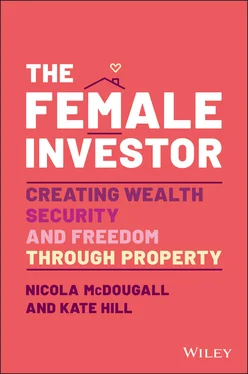ask you about a million questions
come up with a plan to make your goals a reality
help you to understand what you need to put in place and what's involved in meeting your future goals
They can:
help with your household budgeting
set up a savings strategy
compile a comprehensive investment plan to ensure you're heading in the right direction
advise you on what types of insurance will protect you and your family.
They also have the capacity and licences to make investments for you, such as managed funds and superannuation advice.
At some stage, it's always advisable to engage with an independent, fee‐for‐service financial planner who can look at your situation holistically and advise you about estate and retirement planning.
Again, make sure you check their qualifications and whether they belong to their industry body or association. We can't stress enough how important this is!
A buyer's agent is a licensed professional who works for you, the buyer, and acts on your behalf to search, evaluate and negotiate a property purchase. They don't sell real estate. They are engaged independently and paid by the buyer to independently act on their behalf.
The key difference between a selling agent and a buyer's agent is who they represent — by law, in Australia an agent cannot act for and accept a commission from both parties in the same property transaction. Some of the things that a buyer's agent can help with:
search for a property for you
evaluate and complete all the due diligence on the listings available for sale
negotiate the property purchase price and terms
oversee the contract of sale
assist throughout the settlement process
oversee and arrange due diligence such as building and pest inspections, and survey and engineering reports.
By using an experienced buyer's agent, you can:
gain an edge by having your own advocate who is representing your interests 100 per cent
save time spent searching for and analysing property
negotiate to obtain the best price and terms
source the correct property in the right location with better prospects for capital growth and/or rental yield
eliminate stress by having one representative looking after your needs, rather than dealing with several different selling agents.
If you're buying an investment property, then ideally you need a buyer's agent who is also a qualified property investment adviser and who has a thorough understanding of your investment goals, who can calculate cash flows for you, and assess your risks and needs. This is a critical part of the process. Again, check their bona fides before working with them.
QUALIFIED PROPERTY INVESTMENT ADVISER
A qualified property investment adviser (QPIA) performs a different role from that of a buyer's agent. Ideally, you want both of these skill sets rolled into one person.
Property is not an asset class recognised by the Australian Securities and Investments Commission, so, remarkably, the property investment industry remains unregulated in Australia. This means that anyone who feels like it can dish out property investment ‘advice' with pretty much zero qualifications or repercussions if that advice is, ahem, ‘dodgy'.
This sorry state of affairs has meant that the property investment space in Australia is riddled with spruikers who sell inferior property in underwhelming locations, with their only motivation being to line their own pockets, rather than work in the best interests of the people they're selling to.
All is not lost, though — you can seek out professionals who have gone to the trouble of getting themselves qualified, because they care about the financial outcomes and the financial futures of their clients, not just selling you a property on their books.
Go to the PIPA website and you'll find a growing list of QPIAs who have done just that. An ethical QPIA should take the time to:
understand your situation
conduct risk profiling on you
recommend a strategy that suits you.
A growing number of mortgage brokers, accountants and even conveyancers are QPIAs, too.
These people get a bit of a bad rap, like used‐car salespeople and journalists, and most of them really are decent and lovely people with a job to do. Are there some bad apples? Of course there are. Are some better than others? Sure, but you can say that about every industry.
When someone wants to sell a property that they own they will likely engage a selling agent to do that for them. A selling agent has a legal obligation to act in the best interests of the seller. This is called their fiduciary duty. The agent would generally:
advise the seller on what price the property might sell for based on recent comparable sales
advise on and then handle the sales and marketing strategy
negotiate with potential buyers
often (but not always) handle some of the post‐purchase process, such as issuing contracts of sale and liaising with the buyer's mortgage broker and conveyancer to ensure smooth settlement.
When buying property, we can't always choose the agent we work with. The agent is chosen by the seller, not the buyer. You're simply choosing the property you're interested in and will then have to deal with the agent assigned to that sale. However, that doesn't mean they're not useful to you. A good agent will know their area inside out, will know many owners and sellers of property, and may have access to listings that haven't come onto the open market yet.
If you have a good relationship with local agents, then they can tell you when new listings come their way — sometimes before they're publicly advertised. So it pays to be courteous and treat them with respect, because you never know when you may need to negotiate with them. You never know when you may need them to present you and your offer to their client, and if they don't like you, they may not do that in a way most beneficial to you. So be nice!
A professional and licensed conveyancer or solicitor will handle all the legalities of purchasing or selling a property for you.
Signing that contract of sale to purchase a property is really only the beginning of the process, and there's also good reason to engage with them before you sign on the dotted line. The conveyancer or solicitor will handle a range of legal matters to ensure your rights are protected and you meet all your legal obligations, so that the sale goes smoothly.
Keep in mind that the conveyancing process is different in each state in Australia, so you'll need someone who's licensed to operate in the state that you're buying in. You will need to enlist their service to help check over the contract of sale and other related contract‐associated documents before you sign them. They can also help to advise you on the right clauses and special conditions you might want to add or take out, so, that you get the best possible contract terms to suit you.
A conveyancer's job is to:
carry out all the relevant searches required
prepare the settlement documents
conduct title searches (to ensure the property belongs to the seller and confirm whether any debts or liabilities exist on the property)
run local authority searches (to check whether there are any future plans to develop the area upon which the land lies, e.g. build a motorway or develop an apartment complex)
perform strata searches (if you're buying an apartment then you'll want to find out whether the building is running on a deficit or is able to sustain the running of the complex)
find out many more vital pieces of information and manage all the transfer documents
Читать дальше












